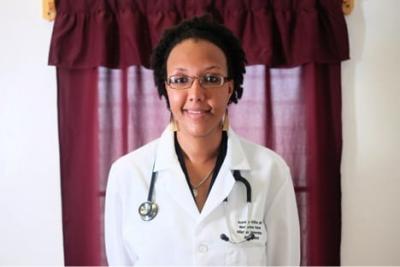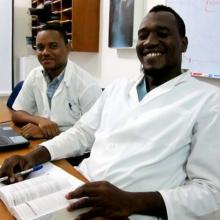
Resident Name: Dr. Aurelie Gilles, First-year resident in Internal Medicine
Mentor: Dr. Philip Cleophat, Director of Internal Medicine
Why is this person your mentor?
Dr. Philip Cleophat is passionate. He not only seeks the best in his students, but he stimulates us mentally and assures us that there is always more to learn.
What are examples of things your mentor helps you with?
Dr. Cleophat is a role model and I aspire to be like him. When he has an objective, he focuses on it until he achieves his goal. His objective for us is to ensure that we are well trained. He is highly intelligent and after years of clinical practice things come easily to him. I hope to practice the same way. He is a mentor that cares about his students. He makes sure we are doing well professionally. He is genuinely concerned about us and gives us great advice for professional and personal purposes.
Why do you think mentorship is important to you and the program?
The most important things you will learn in life, you learn from people with experience. You can learn from books, but it isn’t enough. Mentorship and guidance is needed to help solve problems. The mentor takes all the information that you have learned and transforms it into something practical simply by guiding the mentee.
Mentorship is very important to the residency program. First-year residents can be uncertain about a lot of things. We need the help and guidance that only a mentor can provide.

Resident Name: Dr. Dufens Pierre Louis, First-year resident in Internal Medicine
Resident’s Mentor: Dr. Philip Cleophat, Director of Internal Medicine
Why is this person your mentor?
Dr. Cleophat is charismatic, a leader and an authoritative figure. He knows how to make a team work well. Leaders assign responsibilities to others, but he also wants to understand the people he is leading so he listens to us as well. He pushes the students to assume their responsibility. However, if you have a problem, he accompanies you and helps you solve it. He is universal in his approach to helping patients and he is always ready to respond. I admire all these qualities.
What are examples of things your mentor helps you with?
Dr. Cleophat helps his students not only with diagnosing patients, but also with administration logistics. Sometimes there are things we as residents want to do, but there are barriers. He helps us overcome those obstacles.
Why do you think mentorship is important to you and the program?
It is only natural to find mentors in an academic program of learning. We all pick a path that we are not proficient in but want to master. There needs to be someone to show us how to reach our objectives. We currently are at our baseline. There are things we don’t know and we don’t know how to go about learning them, but there are people here who do know. Their purpose is to walk with us step by step until we reach our goals.
Mentorship is important to this program because learning is an algorithm and a mentor help leads the mentee on the right path. In a program such as this, you can’t randomly put people together and hope for the best outcome. You have to guide them to get them to reach their best outcome. There are mentors that will lead you astray and won’t take you to your destination, but you won’t find that here. People here have taken a mental picture of the system and now they are showing us how to navigate it.

Resident Name: Dr. Marie Christina Joseph, First-year resident in pediatrics
Resident’s Mentor: Dr. Kettie Altenor, Second-year resident in pediatrics
Why is this person your mentor?
Dr. Altenor is patient, kind and a great coach. There is mutual amiability between us. She is the person I work with the most and we are professionally compatible. She watches over me and make sure I’m doing my work right. She wants me to do well. She is a mother-like figure to me. She allows me to ask questions and she makes me feel comfortable enough to ask them. She is a great supervisor that is always there for me when I need her. She even gives me homework so that I can learn more.
What are examples of things your mentor helps you with?
She has actually been helping me since medical school. She and I had a mutual friend that introduced us. She knew that I really wanted to get into this program and she gave me great advice. She has helped me since.
Dr. Altenor is always available. When I’m unsure about something she encourages me. She tells me when I’m doing things well. She gives me guidelines, feedback and helps me prepare documents. She gives me advice on how I can evaluate the health of children.
Why do you think mentorship is important to you and the program?
Mentorship helps the system that has been created. The new residents need to be coached. Mentorship is a great way of transmitting information from one person to another and it is the best method of learning an apprenticeship. It helps and encourages the students in this program.

